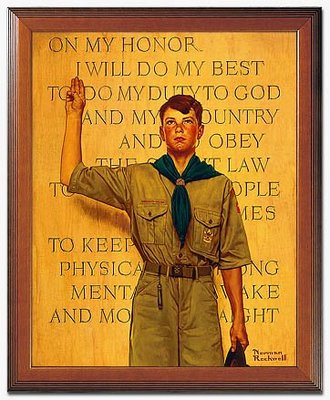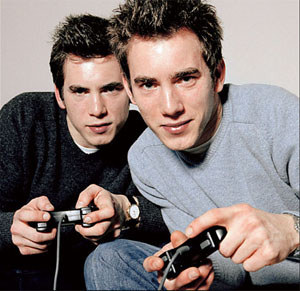 Kearneysville, WV. I was never a Boy Scout. Or a Cub Scout. I recall attending one meeting when I was eleven or twelve, but it didn’t seem that well organized, and I’ve had an antipathy to meetings ever since. Besides, my dad taught me to hunt, fish, and camp, and he made darn sure I could build a fire and tie a square knot. He also taught me to work hard and be honest, so I suppose I got at least part of the spirit of the Scouts without ever being one. At the very least, I’ve always held the Scouts in high regard, and when I hear that one of my students is an Eagle Scout, I take notice. That means something special.
Kearneysville, WV. I was never a Boy Scout. Or a Cub Scout. I recall attending one meeting when I was eleven or twelve, but it didn’t seem that well organized, and I’ve had an antipathy to meetings ever since. Besides, my dad taught me to hunt, fish, and camp, and he made darn sure I could build a fire and tie a square knot. He also taught me to work hard and be honest, so I suppose I got at least part of the spirit of the Scouts without ever being one. At the very least, I’ve always held the Scouts in high regard, and when I hear that one of my students is an Eagle Scout, I take notice. That means something special.
I was surprised, then, to read a recent ABC News report that the the Cub Scouts are now offering a belt loop for video gaming. According to the article, the point is not simply to master video games. Rather, the goal is to teach children to be media savvy.
To earn the belt loop, Scouts have to learn about the video game ratings system, play a parent- or teacher-approved game and create a schedule that includes chores, homework and game playing. Scouts trying for the pin must install a gaming system, learn to comparison shop and complete other educational tasks. (A website called Boy Scout Trail offers a detailed description).
Some former Scouts are less than enthused about this turn of events.
“Being a Boy Scout is about getting outdoors, it’s about being in the woods with your friends and building campfires,” said Christian Marino, 24, a Home Depot manager in Emerson, N.J. “It’s not about sitting at home playing video games.”
Marino said he joined the Scouting as a Cub Scout, graduated as an Eagle Scout and learned valuable leadership skills along the way by constantly interacting with peers.
This discussion raises important questions about the changing nature of childhood itself and the increasing tendency for children to remain inside and plugged in. In this vein the ABC piece offers some sobering numbers:
A March report in the journal Pediatrics said that children and teenagers spend more than seven hours every day using media, such as television, video games, cell phones and computers.
Children are tuned in, wired for sound, and texting. No doubt such a fact has contributed to this attempt by the Scouts to prepare their young charges for the media saturated world that they are already actively engaging. Yet, I wonder. Maybe parents should get a merit badge for telling their kids no. No, you don’t need a cell phone. No you don’t need the newest video game (or any video game for that matter). No, you don’t need an Ipod (or anything else that isolates you from the rest of the world). No, you don’t need to watch anything. Here’s a ball, go play. You say you’re bored? Here’s a broom. Clean the garage. Cut the grass. Wash the car. Vacuum the house. Clean the toilets. Someone has to do those things. You’re part of the family.
There’s no reason to create a false picture of reality for the youngsters. That way adulthood won’t be too much of a shock.
Perhaps we parents need to set a better example. If our kids see us enslaved to our Blackberrys, laptops, and cell phones, is it any wonder that they should think that is normal? The outdoors is, for many, not an integral part of our lives but something we quickly pass through in order to get from one indoor venue to another. Or it is something we set out to consume on special weekend getaways from which we return exhausted, bug-bitten, and grimly satisfied. In either case, the natural world is something we brush up against occasionally, either as an obstacle or an item to consume, but it is not a fundamental part of our lives, and we surely don’t conceive of ourselves as part of it. Nevertheless, we are part of it, and it is part of us. To live well is to come to grips with the many aspects of that truth.
With all that, the technological fun house that is the modern home makes the great outdoors pale by comparison, if, that is, the expectation is immediate and constant bursts of electronic stimulation. Indeed, enjoying the outdoors requires a willingness to submit to the pace, scale, and vocabulary of the natural world. One cannot step outside and expect the world to present itself as a video game, a music video, or even as reality television. There is a vastness that dwarfs the narrow confines of pre-packaged entertainment where the channel or the volume can be changed in an instant and at a whim.
In his book, The Last Child in the Woods, Richard Louv quotes a child whose frankness makes his words all the more troubling. “I like to play indoors better ‘cause that’s where all the electrical outlets are.” Now aside from the occasional current bush, the kid is dead on, but what does it say about our children that they would rather engage with an electronic screen than with the blumin’, buzzin’ confusion outside their doors? Is it any wonder that child obesity is at all-time highs? Is it any wonder that the passivity inculcated by hours of electronic media every day would fashion children into consumers who are all too happy to feed at the public trough as long as it doesn’t hurt or pull them away from The Simpsons reruns?
Recently I began planting our garden. Without being asked, my oldest son, Seth, who is twelve, joined me. We spend an hour or two on a warm Sunday afternoon loosening the soil, forming rows, and planting peas, beans, and lettuce. We worked side-by-side, talking as we worked. The pace was steady but not hurried, even though dark clouds were piling up in the west. At times we were quiet, joined by a common pursuit, working as complements of each other. The soil was warm, birdsong filled the air, and we were together. We finished as the first heavy drops of rain began to pock the freshly turned soil.











Parents certainly are responsible for much of their children’s behavior. Pehaps the parents are scared of what their children might do if they were encouraged to go outside–after all, they are not professional gardeners/woodsmen/mechanics! They might do damage without any harmful intention. I ran into this when I discovered that Reagan (almost 11) and Heidi (8) had planted seeds in our garden plots without asking me (the appointed gardener for the family). They both chose cold-weather crops to plant in Texas in March and April… we’ll see whether the produce actually makes. But they wanted to garden, and are faithfully tending their plots. Eventually they will learn what to plant when.
Their actions, though, required me to be flexible and charitable. If parents are enslaved to their Blackberries and Iphones and whatnot, they have no flexibility and little practice in charity. We who do love, however imperfectly, must ask for the spirit of Elijah, that we may “turn the hearts of the fathers to their children, and the hearts of the children to their fathers.”
I do feel sorry for kids who can’t enjoy themselves outside. Most video games are fun, but playing outside involves a more fundamental kind of pleasure in the grace of the body and earth, and it’s disconcerting and sad to think kids are missing out.
As an Assistant Cub Master I do not have any problem with the gaming award… or any other award or recognition (like the Pinewood Derby)that can or must be accomplished indoors. The key here is to have a good mix of indoor and outdoor activities for the kids. The BSA focus is still on outdoor activties.
The real problem, it seems to me, is peer pressure. Once one kid gets the latest device all the kids beg their parents for it and the parents cave not wanting their kid to be seen as lacking amongst their peers. I remember reading somewhere about a parents group in Maine that had joined together in agreeing not to go this route so that the peer pressure did not arise. I’ve never understood why there are not more of such groups, or charter schools started with this agreement among parents.
Thank you for this. After growing up in the woods, going to college in farmland, and spending summers by lakes or the ocean… the shock of adulthood for me is having to work inside all day.
I live in a lovely little neighborhood in a reasonably safe small city. I remember when my son was tiny, encountering two neighborhood children who, when I took him out for regular stroller walks, would neither make eye contact nor respond to my “hello”s. They lived on my block. As a mom, it made me sad to know that these kids were under the rule of the “don’t talk to strangers” years. Next logical step, of course, was to keep them all inside, safe and sound. I threw the dice once and let my then seven-year old venture around the corner, out of sight, long enough for him to sit on a bench for a while in a mini-park in the neighborhood. I was where I could see him and he couldn’t see me. He meandered home with a stop along the way to sit on a neighbor’s lawn. He arrived with a four-leafed clover that had taken a while to discover. I wish we could regain enough faith in our communities that our children might experience the early confidence such forays engender. We still have that years-old clover in a picture frame. I would love to see the day when the neighborhood “eyes on the street” can give childhood back to our kids.
Not having met my dad, my grandfather played a significant role in my growth. For much of my life, he and my grandmother lived in an RV and stayed at various state-parks throughout Central Florida where I grew up. He took me on forays into the forest and taught me how to read a trail and gave me an appreciation for being out of doors. Later, my grandparents bought a home on a large pond (they called it a lake) in a rural area nearby where I would spend my summers sitting on their dock, watching fish splash and large water birds swim like miniature Loch-Ness Monsters.
But I’d also play video games. I’m still a bit of a techno-phile (after all, I am typing on a computer for an online blog… can’t really get more technological). But that entrenching of a love for the natural world was very crucial.
It wasn’t until a few years after my grandfather died that I took a long weekend hike on the Appalachian Trail, just after my Junior year of college. No phone. No cars. It was nice to be back in that element, having on my back all that I needed. Around that same time, a group of friends and I got shipwrecked (okay, canoe-wrecked) on an intercoastal island in Florida. Both instances reminded me just how unnecessary all that technology is. I don’t think it’s wrong, per se. But it definitely needs to be tempered. Balanced.
IPods do disconnect us from each other. Any urban foray will reveal that. Technology keeps us atomized and locked out of the communal world we are created for. Having the boy-scouts now endorsing this is a tragedy.
Thank you for this article and for allowing me to share my disjointed thoughts on the matter. I’ve now been reminded of a few values I need to embody for my children and my grandchildren.
I had my older son involved in Cub Scouts for awhile, and I was a bit put off by, among other things, the ads for video games in Boys’ Life magazine, the official magazine of scouting. For parents and leaders in the organization, electronic entertainment seems to come down to a time-management issue, and there is little or no sense that endorsing video games might be undermining the core principles of responsibility and respect for the natural world. This, in combination with some questions raised in the media about shady land-use deals on property entrusted to scout troops, made me wonder whether the organization has lost focus.
nancy: Your comment regarding safety and insulation touches on the reasons for Scoutings drop in numbers. What modern mom today wants to have their sons alone in the dangerous, dirty, and unsanitary outdoors? Instead, we have organized soccer games, where mom with a constant supply of orange slices and gatorade keeps the kiddies of both genders stocked and safe (a travesty to the committed fans of local, pub-based futbol, I am sure). Scouting demands a loss of control for mothers. However, there was something worthwhile in sleeping in a thunderstorm under a lean-to during my Wilderness Survival badge.
Mr. Shiffman: the Cub Scouts have little going for them anymore save the Pinewood Derby. As an Eagle Scout myself, I can attest to this fact as well as the differences amongst individual Boy Scout troops. As a Victorian institution, the BSA is struggling to keep an identity in a world of lawsuits and homosexuality. To its credit, it has kept true to many more of its principles than its Victorian contemporaries, such as the YMCA, 4H, and Girl Scouts.
Comments are closed.